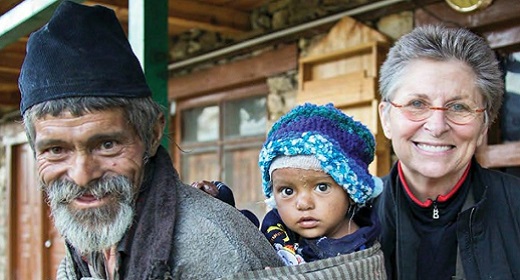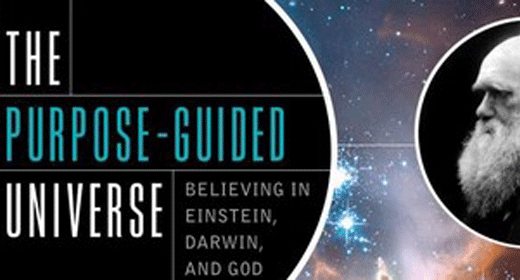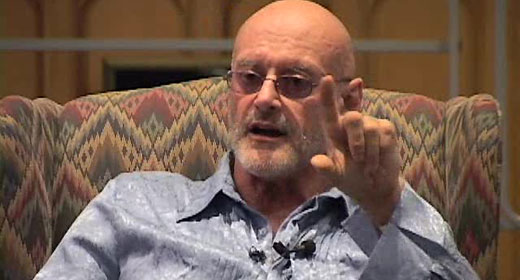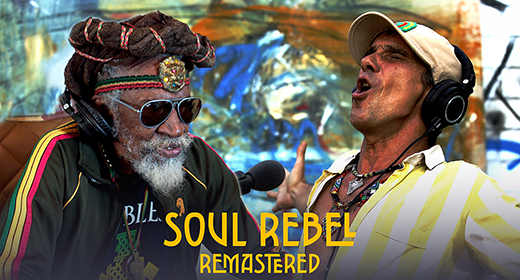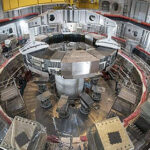Donna Quesada: With all of that said, religion had a real problem with what Galileo was doing.
They sequestered him, didn’t they?
Ken Wilber: I’m sorry.
DONNA: Religion had a big problem with what Galileo was doing…
KEN: Oh, yes. They threatened him with torture. Yeah. They convicted him to house arrests for a year. They finally got him to stop talking about it by showing him the instruments of torture. That, by the way, is where we get the term, like first-degree, second-degree, third-degree. First-degree torture is describing torture to the person. Second-degree torture is showing them the instruments of torture. Third-degree torture is actually torture. So if you got the third degree, you’re in a world of hurt.
But yeah, that battle between science and religion started then, and it started, almost all of the mystical experiences ran into this problem. They all had to tiptoe around the very highest stage that you could get to, which is where you became one with God. Because Only Jesus Christ could do that. So all the rest of the mystics… although there were hundreds of them that had that unity experience and reached stage nine… but very few of them talked about it. I realized why.
DONNA: Why?
KEN: Yeah. So that was the rational stage, the formal operational stage. The thing about rationality is that it views the world as a unified system. So you no longer had, for example, Protestant chemistry versus Hindu chemistry. You just had chemistry, period. It was the same for Protestants and Hindus, Greeks, Germans, Frenchmen, and so on. The previous stage is the emergence of rationality starting around 1500 as we saw with Kepler and Galileo. That lasted several hundred years.
It marked the beginning of what we call modernity, because what the Enlightenment brought was a modern way of thinking, which was logical, rational, and it wasn’t mythic literal, magical, or any of those. The modern stage lasted from about 1500 till around 1960 or 1950, right about there. Then what happened to people that call themselves postmodernists, because the previous state had called themselves modern and they wanted to get over that… The reason they wanted to get over it is as they looked at these universal systems that rationality was creating, they noticed that there were so many different cultures around the world.
All of these cultures had various types of truth claims, and many of those truth claims were true. But rationality just overlooked all of those. The postmodernists started including… and so they called it multicultural or postmodern. That’s still the essential era that we live in today, although we’re getting very close to the emergence of an integral stage, which I’ll talk about in just a minute.
DONNA: Their motivation was fair though. They wanted a kind of fragmented, inclusive multidimensional view of the world where all voices would carry some weight. The noble kind of intention.
KEN: Yes. They wanted to create a multicultural framework and that certainly got taken perhaps to extremes in America. But we have a multicultural culture.
DONNA: Inclusion of many voices and all of that…
KEN: That’s right. So the one thing that… the pluralistic stage is called the pluralistic stage or postmodern stage. The one thing that the pluralistic postmodern stage could not do was tie all of these multiple realities together. They just fragmented because they were just completely befuddled as well. How does this French truth go with this Pakistani truth? How does that truth go with this South American truth that they just completely fragmented? We’re still living a large portion of that fragmentation today because we’re still in this pluralistic postmodern era. But as we move through the postmodern era, particularly towards the end of that era and the beginning of the next or integral era, and you can probably guess what the integral era did from its name. But people started to figure out ways to put together all these different worldviews. So developmental psychologists who are busy creating the little written still-on-the-blank tests that they can give people and figure out what stage they’re at started putting in questions about, well, how does this one fit with this one?
How do you make that thought connection and so on? What they would find is that a new type of cognitive process emerged, which… who had done almost all of the research on the earlier cognitive stages of natural intelligence, pre-operational cognition, concrete operational cognition, formal operational cognition, and systemic, which is the stage that we’re talking about now. He started looking into those individuals who could pull together these different types of worldviews. Many developmental psychologists started calling the pluralistic postmodern worldview by the name A Paradigm. Just what a paradigm does in science is it takes many of the subgroupings of chemistry and biology, and puts them together into a paradigm which is called biochemistry. It still can’t hook one paradigm to another. That’s the first of the two major stages, many of these stages have several sub-stages.
Natural intelligence has six sub-stages. But the integral stage has two stages. One, we also give each of these stages a color. The first one is called teal, and the second one is called turquoise. What teal can do, where the previous… what we call green pluralistic postmodern stage, could not do. It could only create paradigms. It could not create a cross-paradigmatic worldview, which is where all the different paradigms were brought together crossed, and unified. But that’s what teal could do. That’s what all the tests started showing… that people who reached the teal stage could indeed come up with what they call cross-paradigmatic thinking.
Cross-paradigmatic thinking works on both levels of the integral stage and a cross-paradigm is that you take the whole of one paradigm and you find ways to hook it to another paradigm. So in a sense, biochemistry was actually the beginning of cross-paradigmatic thinking because it took two. Chemistry and biology and hook them together. So now we have neurophysiology, neuropsychology auto suggestive immune disorders, and all sorts of different cross paradigmatic things.
DONNA: Interesting. Now, this desire to kind of bring together, is this a neo-modernism? Are you a neo-modernist?
KEN: Well, neo-modernists are a small group of people that have branched off from integral and they call the integral stages neo-modern. Apparently to fit with modern postmodern and then neo.
DONNA: Okay. Where would you put yourself?
KEN: Since they’re using my stuff and maintaining it, I would have to call myself a neo-modernist. But I’m not going to give that a whole lot of attention.
DONNA: I have to ask you one thing. This is from myself. We’ve moved away from the magical realm, but at the same time, we are referencing Vedanta as being one of those world religions that embraces a non-dual system, but they also leave room for magic. You know, you hear about the siddhis, the magical things that the yogis can accomplish after years and years of sitting. Is there room for magic? Please say Yes.
KEN: Is there what?
DONNA: Is there room for magic in a non-dual system, in an advanced, integral system?
KEN: Oh well, we recognize it as an important foundational state of overall human development.
DONNA: I mean like those Yogis who are, you know, manifesting things out of dust and levitating…
KEN: Well, that’s where we write about the difference between psychic and magic. Psychic is a stage that in my system, is the first stage beyond the integral stage. I call it psychic. It can, first of all… the amount of research on paranormal events just in general, clairvoyance, ESP, and so on… The undeniable conclusion of all of that research, if you look at it all together, is that various paranormal events occur with 100% certainty. So there are very real types of ESP, telekinesis and so on. They actually do occur. They have very convincing proof of the existence of these stages.
DONNA: But yet, these things are quite in a different category than the magical religious stage.
Ken: Yes, exactly. That’s basically what I write about. Here’s what marks psychic and here’s what marks magic. Confusing the two is a version of what I call the pre-trans fallacy. The pre-trans fallacy is a very common mistake, especially among mystical writers, and especially among quantum mechanical mystical writers. Pre/trans means that in any system you make pre-rational stages and trans-rational stages. Because they’re both non-rational and often get equated and confused. So a trans-rational event is confused with a pre-rational event. The psychic event is confused with a magic event. This goes for whenever you take a developmental sequence… it always moves from pre-X to X to trans X, to then pre-Y to Y, to trans-Y, and then pre-Z to Z to trans-Z.
So you can get a pre/trans fallacy anywhere there’s a development stage. Because there’s always a stage that precedes a particular stage. Then there’s a stage of development that continues, that goes beyond that stage. You can confuse the beyond the stage with the before the stage. That gives you pre and trans-confusion.
DONNA: I see.
KEN: When I came up with that, I called it simply… a paper called the “pre/trans fallacy.”
DONNA: Can you say that again? What was it that you called it?
KEN: Pre/trans fallacy.
DONNA: Okay.
Ken: PTF, Pre/trans fallacy. It probably got more effusive, wild praise and attention than any other single work I had written. Certainly articles. I’ve written a lot of articles. I’ve written, oh, over 300 articles. But that one stands out because it’s so obvious when you see it, whenever you look at any developmental sequence, you can always see pre-operational, operational, trans-operational, and so on. Everybody was just slamming themselves in the head going, why didn’t I think of that? It’s so obvious. But everybody was praising the daylights out of it. It was a very fun time for me actually.
DONNA: I bet. Well, with that, Ken, I’d like to thank you for your time today.
KEN: Of course.
DONNA: It was, as it was before, just a delight to explore these topics with you.
KEN: Sure.
DONNA: I continue to learn from your book. I can’t wait to meet with you again and go deeper into each individual stage. Would you want to do that for us next time we meet?
KEN: Sure.
DONNA: That would be great. Then we can link it back to your program because I believe you are hosting a program on these stages?
KEN: Yes. We’re going to give, and I’ll be a main teacher and we’ll do it in face-to-face Zoom conversations. It is in the book Finding Radical Wholeness. So we’ll go through each chapter.
DONNA: How wonderful. Well, we will be sure to have that information below the interview and talk more in-depth next time.
KEN: Great.
DONNA: Thank you, Ken.
KEN: My pleasure.
DONNA: Bye-bye.
KEN: Bye-bye.
Purchase Finding Radical Wholeness Here.
Read and Watch 2nd Ken Wilber Interview pt 1 Here: 2nd Ken Wilber Interview Pt 1 – A Spiritual Experience Is A Direct First-Person Experiential Awareness
Read and Watch 2nd Ken Wilber Interview pt 2 Here: 2nd Ken Wilber Interview Pt 2 – Moving Beyond Mythic Religion
Read and Watch 2nd Ken Wilber Interview Pt 3 Here : 2nd Ken Wilber Interview Pt 3 – What Good Is Awakening?
Read and Watch 2nd Ken Wilber Interview Pt 4 Here: 2nd Awaken Interview with Ken Wilber – Pt 4 -The Growing Up Experience
Source: AWAKEN
Here is a link to our first interview with Ken Wilber: Read and Watch Pt 1 Here: Awaken Interviews Ken Wilber Pt 1– Every Sentient Being Including a Dog, Has a Buddha Nature





